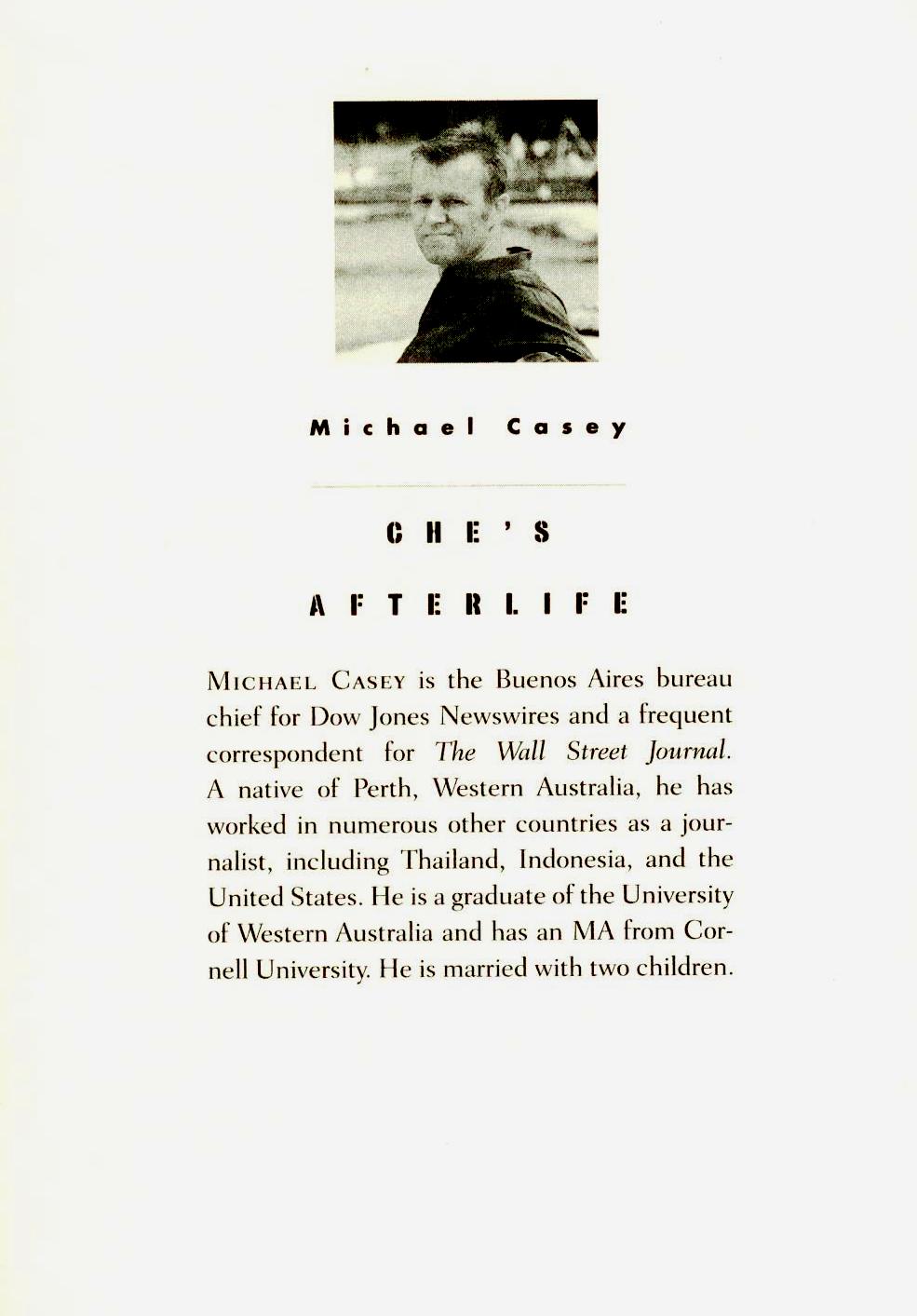Review of Che’s Afterlife: The Legacy of an Image. By Michael Casey. New York: Vintage Books, 2009. Pp. 388. $15.95 paper. ISBN: 9780307279309.
Michael Casey, from Perth, Western Australia, and recently the Dow Jones Newswires Bureau Chief in Buenos Aires, has written an excellent book on the commercialization of Che Guevara. In Che’s Afterlife, Michael Casey follows Korda’s famous photograph of a Christ-like Ernesto “Che” Guevara into the consciousness of people around the world. This image is a well-defended and trademarked icon (copyright VA-1-276-975) owned by Korda’s daughter, Diana Díaz, and used in collaboration with the government of Cuba.

Korda’s “Che”
For some, the Korda image of “Che” is a quasi-spiritual symbol of hope for a better future. For others – those sporting the Che T-shirts for example – it is a symbol of undefined but earnest youthful rebellion. But for still others, it is an abhorrent symbol of the kangaroo justice meted out in La Cabana fortress – converted to a prison – in East Havana where Che as commander of the prison presided for 11 months over the summary trials and executions of somewhere around some 220 prisoners or of many more.
For me, Che may be all of the above and more. But he is also the economic czar who damaged the Cuban economy immensely. First, as President of the Central Bank, he presided over the loss of convertibility of the Cuban peso which has continued for half a century. Convertibility of the Cuban peso now appears far from current realities. Second, as Minister of Industry he amalgamated five sub-units into a behemoth Ministry responsible for running some 1,800 work units with 150,800 employees. Attempting to run so many enterprises from office towers in Havana was a central planning folly of immense proportions. Third, he was the prime mover of the attempt to use the “New Man” concept as a means of mobilizing the work efforts of Cuban citizens in the second half of the 1960s and also the author also of the so-called “budgetary system of finance” that abolished accounting and the financial autonomy of productive enterprises. Implementation of these approaches was in President Castro’s hands, not Guevara’s. These two dimensions of running the economy from 1965 to 1970 compounded the problems and dislocations of the attempt to produce 10 million tons of sugar. These three interlinked dimensions of running the economy met with such disastrous results that they were reversed in 1971. Cuba then moved to Soviet economic orthodoxy – plus Soviet loans and hidden subsidization – which produced surprisingly better results.
Casey has written an intriguing history of the image’s trajectory over the last half century. He brings together research into the lives of both Korda and Guevara, a command of the history of Revolutionary Cuba, knowledge of countries where the Guevara mythology is important, an understanding of copyright law, and original investigative interviewing and reporting.
Casey begins his narrative with the instant when the photo was taken on 5 March 1960. He sketches Che’s role in the new government—notably as chief of La Cabaña prison and overseer of the swift executions of prisoners—his secretive and disastrous Congo operation, and his guerrilla campaign in Bolivia, putting the launch of Che as icon and of the “Heroic Revolutionary” brand at the 18 October 1967 memorial ceremony at the Plaza de la Revolución.
Casey also presents an account of Korda’s activities in Havana, the first publications of his photograph, and the cultural ferment of the early years of the Revolution, followed by the disillusionment of many in the mid-1960s.

Alberto Korda
He traces the peregrinations of Korda’s “Che” through Argentina, Bolivia, Venezuela, and Miami, as well as in the student ferment of 1968 from Paris to Berkeley. His later chapters focus on the use of Che’s image as a brand by the government of Cuba; here, it no longer signifies a heroic guerrilla promoting revolution, but has instead become an advertisement, selling Cuba in the international tourist marketplace. The essence of the image ia now “the idea of revolutionary nostalgia” (306). After some thirty-seven years during which the photograph was freely available for use by anyone, copyright ownership now applies and control is exercised through legal means when necessary.
Casey takes us on a fascinating journey through the life and afterlife of Che and through a half century of international social and political history, using Che’s image as a prism. His book should find a wide readership, of all political stripes, who have an interest in Cuba or in major political and social movements. Those with interests in marketing, branding, and copyright law will also find this volume illuminating.








